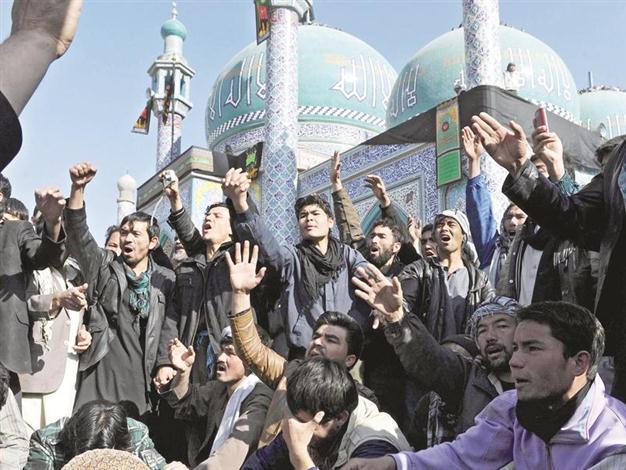Afghans point at Pakistani group for bloody Ashura
KABUL / ISLAMABAD

Afghan men sit around a coffin of a victim of a bomb attack against Shiite Muslims outside the Karti Sakhi Shrine in Kabul. AFP photo
Afghans yesterday buried 59 people killed in unprecedented bombings against Shiite Muslims as officials blamed Pakistani militants, accusing them of trying to whip up Iraq-style sectarian violence.Investigators are trying to find out who was behind coordinated attacks in the Afghan capital Kabul and northern city of Mazar-i-Sharif that the Taliban, the main faction leading a 10-year insurgency, have denied carrying out.
Meanwhile, 12 Afghan civilians were killed yesterday by the latest roadside bombing to strike the country in the troubled southern province of Helmand. An Afghan official claimed that the bomber who attacked a shrine in Kabul on Dec. 6 was a Pakistani, affiliated to Pakistan’s extremist Lashkar-i-Jhangvi group, which has been blamed for killing thousands of Pakistani Shiites.
The faction, which is linked to al-Qaeda has not previously claimed responsibility for any attacks in Pakistan’s neighbor Afghanistan. Sources suggest that if Lashkar-i-Jhangvi, or indeed any other Pakistani militants, orchestrated the attacks, then elements in the Afghan Taliban may have helped facilitate the strikes.
President Hamid Karzai scrapped a planned trip to Britain, flying back to Afghanistan for an emergency meeting with security chiefs after attending Bonn conference on his country’s future. Afghanistan’s National Directorate of Security intelligence agency confirmed that an investigation into the tragedy was now under way. Sediq Sediqqi, a spokesman for the Afghan interior ministry, said the attack was the work of “the Taliban and their associates,” adding no-one else carried out such suicide attacks in Afghanistan.
Pakistani President Asif Ali Zardari is in Dubai for treatment for a heart condition, the government saidyesterday, with one source saying he had suffered a minor heart attack and fuelling speculation that the unpopular leader may resign.
An article published Dec. 6 on the website of Foreign Policy magazine appeared to be the source of the speculation. It quoted an unnamed former U.S. government official as saying Zardari was “incoherent” when he spoke with President Barack Obama by telephone over the weekend.
Compiled from AFP and Reuters stories by the Daily News staff.
















